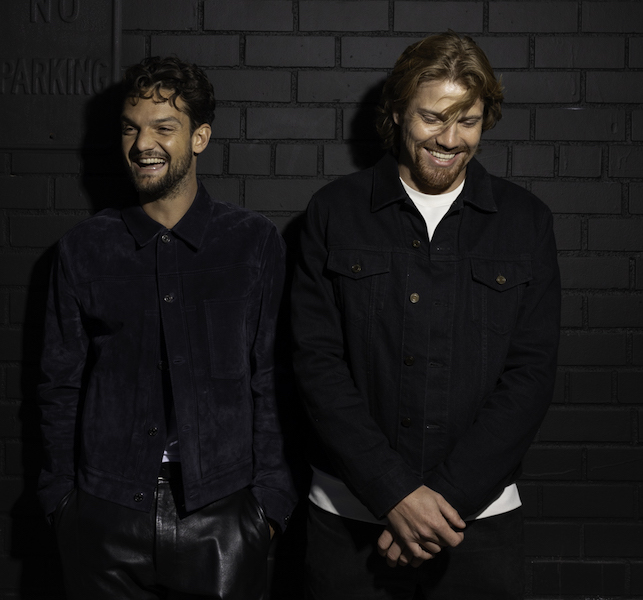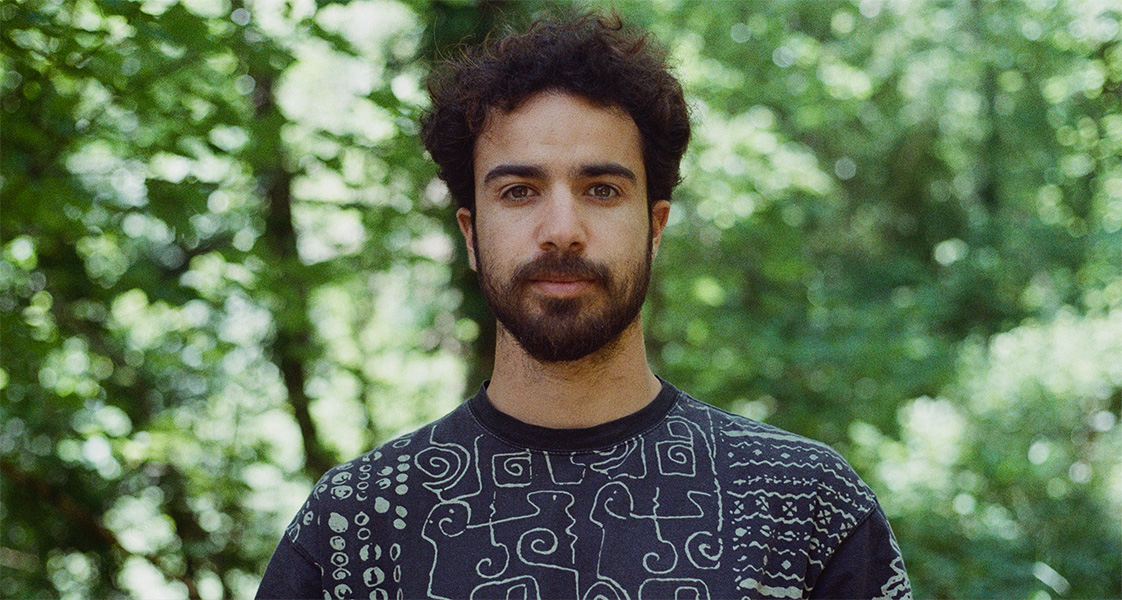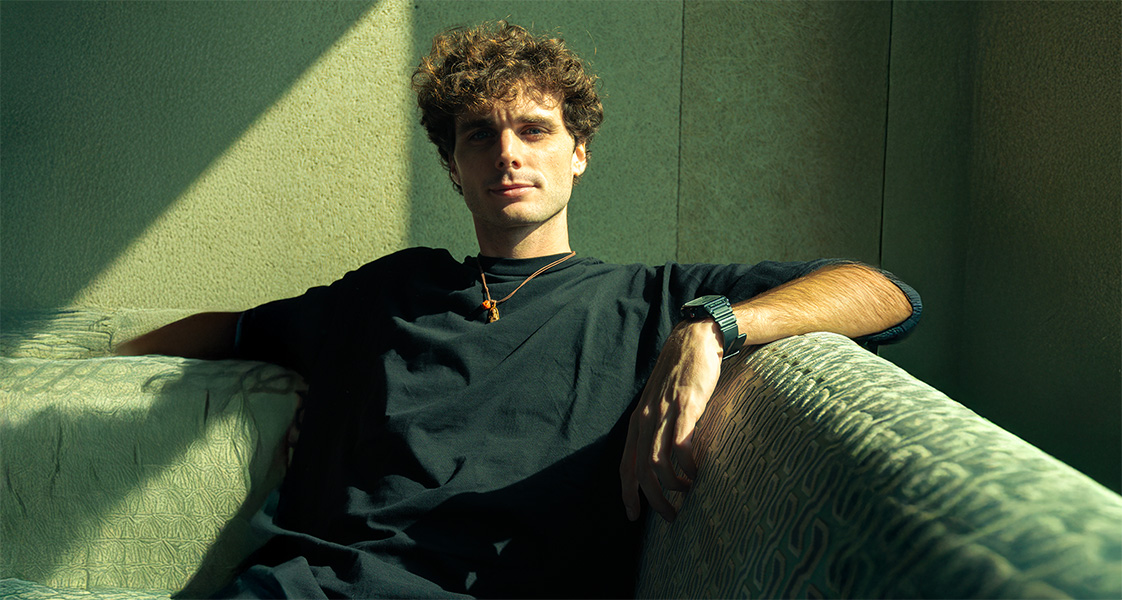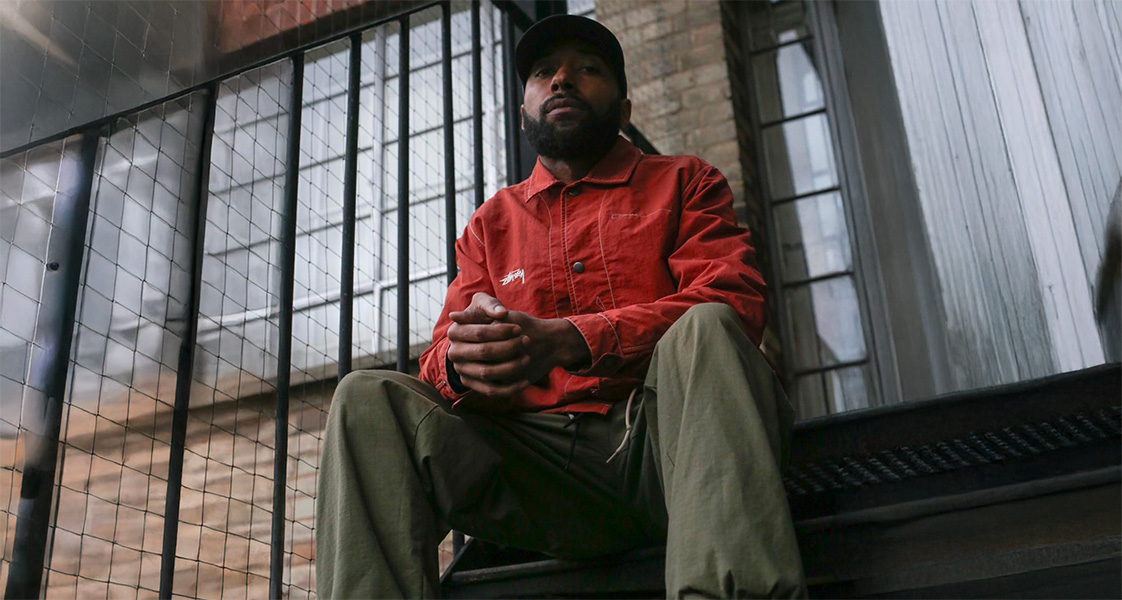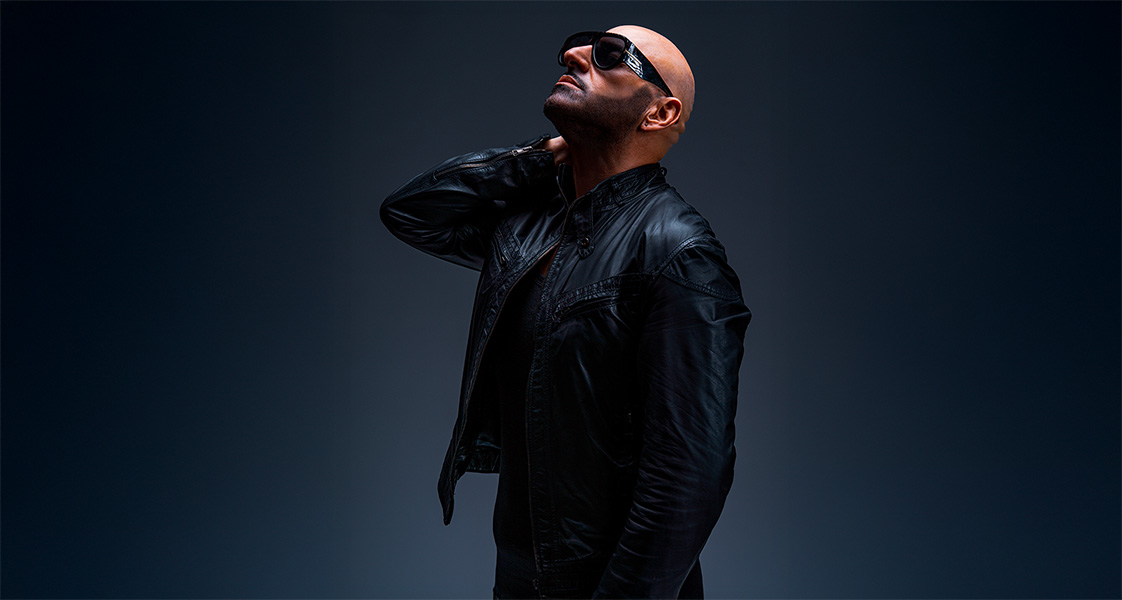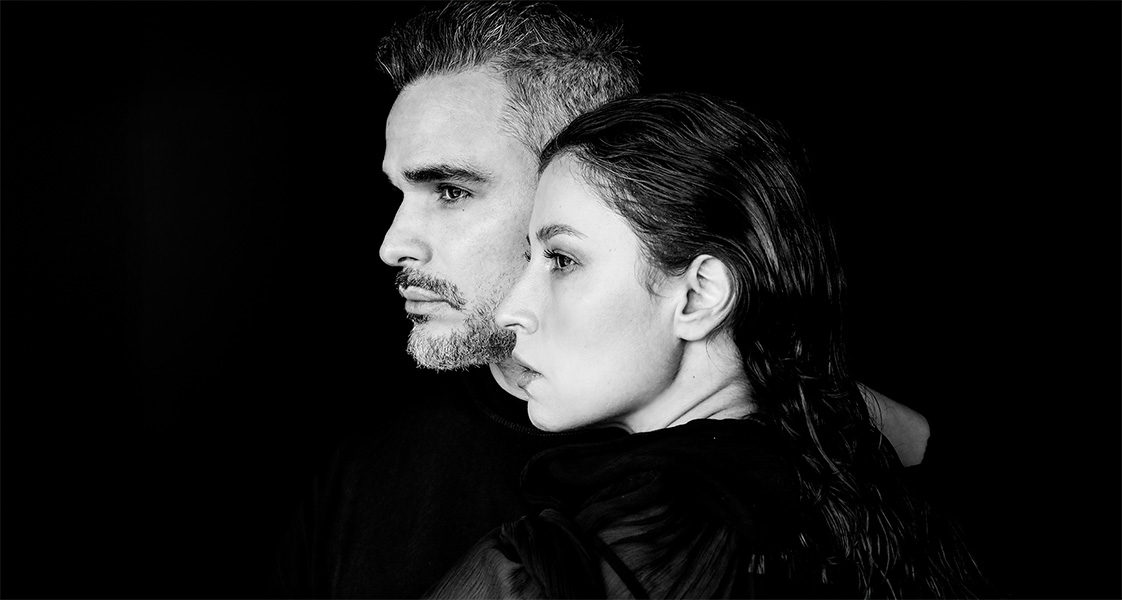Julian Connor and Mykola Smith may have somewhat predictable beginnings as a DJ duo – two friends who met at university, moved to New York City, and began to throw events for their community of friends – however Muffs & Mykola are nothing but. The two meld their charisma with their music tastes; their sets are constructed in a way that inspires the drive to dance through an amalgam of genres and sounds. There are no musical boundaries, just good tracks that elicit the right groove.
A lot has marked their DJ career since 2014, when Muffs & Mykola first became a “thing.” They have had the privilege of playing many of New York’s nightlife institutions – Output, The Brooklyn Mirage, Teksupport, Elsewhere, 10ak, House of Yes, and various others – in addition to their own vyvn events. SXM Festival, Elements Festival, Gather Festival, Disco Knights and Distrikt at Burning Man are some of the acclaimed brands of the festival circuit Muffs & Mykola have been invited to play. In addition, they’ve shared the stage with industry respected names such as Maya Jane Coles, Adriatique, Serge Devant, Robag Wruhme, Anja Schneider, Monkey Safari, Martin Buttrich, Life on Planets, Matthias Kaden, Shaun Reeves, and DJ Three – just to name a few.
We caught up with the duo (separately) to discuss their tour in Asia, all things DJing in NYC, what the future holds, and more fun stuff. Dive in!
JULIAN MUFFS
WWD: You and Mykola have been DJing together for years. What do you think makes your dynamic work so well as a duo?
Julian Muffs: I would say two things: our shared taste in music, shaped by experiencing a pivotal era of house music, and a similar style of partying. We spent a number of our formative years listening to and being inspired by the same genres. For example, the 2009-2014 era of house music—Crosstown Rebels, Last Night on Earth, Hot Creations—basically made me borderline obsessed with house music. I’ll never forget the frequent trips to Miami for Music Week, spending countless hours at the Electric Pickle or Ice Palace, seeing all our favorite artists.
On the party side—we just really enjoy playing music with and for friends on great sound systems. We’ve thrown a ton of parties because we genuinely love it. Even on a random weekend, you can probably find us jamming with friends.
WWD: You just got back from an incredible tour in Asia, playing legendary clubs like Womb in Tokyo. What was the biggest takeaway from that experience?
Julian Muffs: On the club side, the biggest takeaway is how incredible micro clubs can be. The micro club culture in Asia is next level, and it’s something we hope to replicate in NYC soon.
On the touring side—there’s no better way to experience a new city, region, country, or continent than through the eyes of locals. This is my favorite part of traveling in general, but especially while touring. Big shoutout to label mate and owners Red Pig Flower and Knock for showing us Tokyo, Kana and Jonathan in Osaka, Camilla and Bogdana for Niseko, and GuyStyle in Seoul.
WWD: What was the most unexpected or memorable moment from your time in Asia?
Julian Muffs: I’d have to say playing the Seth Troxler and Ryan Crosson remix of ‘You’re So Just Just’ at Area in Osaka. The club turned inside out. I also loved when the rules and reality started to fray once the club reached full ignition.
WWD: With your upcoming gig at Hearsay in NYC, how do you approach playing a hometown set differently from touring internationally?
Julian Muffs: When playing outside of NYC, we have to spend more time finding the strike zone for that crowd and city. When it’s a home game, all bets are off, honestly. We know exactly what the crowd comes for.
WWD: You’ve been a resident DJ with Vyvn for a while now. How has that experience shaped your sound and approach to DJing?
Julian Muffs: One of our goals with this party series is to use it as a forum to achieve what we believe is an optimal vibe. We experiment more during our parties because the crowd knows what they’re coming for—there’s less of a need to convince anyone. So we use the reactions from our own parties to inform what we play elsewhere, as well as what styles of house we should invest more time in producing.
WWD: NYC has one of the most competitive nightlife scenes in the world. What do you think sets a truly great DJ apart in this environment?
Julian Muffs: It’s changed over the years. Five to ten years ago, it was purely about draw and economics—can this DJ sell tickets? Can they throw profitable parties? Now, I believe you actually have to be an artist to be a truly great DJ. You can’t just be a fuck-off party kid as much anymore.
WWD: What’s one piece of advice you wish you had when you first started DJing?
Julian Muffs: Have multiple backup thumb drives, only play tracks you love, invest five times more time and energy into producing than you’d expect. And—whether you like it or not—social media presence is critical so establish it early.
WWD: What’s a track that’s been a staple in your sets recently?
Julian Muffs: Symmetry by Silat Beksi is a classic track for us and our sound. Drivey, progressive, clean, metropolitan, nostalgic, and dreamy. We draw heavy inspiration from this vibe when we produce.
WWD: If you could put together your dream lineup for an intimate underground party, who would be on it?
Julian Muffs: Sasha, Infinity Ink, and us—on a yacht in Ibiza for 80 people.
If I had to do it in NYC, I’d throw it in a backyard from 3-10 PM on a summer Saturday. We’d deploy our Funktion-One, have an open bar featuring skinny mezcal margs, and set up a block-party-style grill with jerk chicken – I’ve thought about this a lot, clearly.
WWD: Beyond DJing, you’ve also been focusing more on music production. Can we expect any new releases from you soon?
Julian Muffs: Absolutely. We’re currently shopping around a number of releases. Expect a variety of EPs that capture our dynamic range as a duo. We’re also looking forward to having some of our favorite artists do remixes.
MYKOLA
WWD: How did your journey into electronic music start, and what drew you into the underground house and techno scene?
Mykola: Hip hop was my gateway into electronic music. I love the thick, layered basslines and electronically sampled drums. At around nine years of age, there was a group of teenagers who had a pair of Stanton turntables in the “Teen Room” at the Boys and Girls Club, which unfortunately I would not be able to enter for another four years. They would spin records after school and I would watch from the entrance, which is the closest they would let me get. I actually never went in that room, but it left an impression on me. I started walking dogs and saved up enough money for the same pair of turntables and a Radioshack 4-channel mixer. My neighbor took notice, and realized I liked more instrumental than lyrical hip hop. I think he worked for Universal Music Group. He left a box of CDs on my doorstep one day with recent releases from the likes of Prodigy, DJ Krush, Propellerheads, etc. I still love hip hop to this day, but from there I got into breakbeat and drum’n’bass, then eventually house music.
WWD: Your tour in Asia took you to some incredible venues. How did the crowds there compare to NYC’s?
Mykola: I think as Muffs said, the micro clubs are what really set them apart. In NYC, it feels like smaller venues are really struggling to stay afloat. You either need to be a bar/restaurant that also has music, or you need to be a nightclub with 300+ capacity and play the numbers game. There really is no viable business model for smaller venues like Japan’s listening bars. I will say they seem to dance a bit less and spectate a bit more, which is totally fine. NYC has always had this raw feeling of self-expression, whereas perhaps Asia is more about self-reflection through music. I think there’s a time and place for both.
WWD: Womb in Tokyo is considered one of the top clubs in the world. How did it feel to play there, and did it live up to its reputation?
Mykola: Definitely! It’s hard to imagine anything like that existing anywhere else in the world. You just don’t see megaclubs in the heart of a metropolitan center anymore. The space was packed out. People were ripping cigs inside. The sound and lighting were dialed in. We played on the top floor, which was a bit more intimate. People cycled in and out all night, and it was nice to see that we managed to capture people’s attention and they stayed engaged for the duration of our set.
WWD: You and Muffs have been part of NYC’s electronic music scene for over a decade. How have you seen it evolve?
Mykola: It’s certainly gotten more commercial. House music is fully mainstream now, and that has brought a lot more opportunities to play and gain exposure. People always like to whinge about how this neighborhood is getting gentrified and how it shuts down that old club or other, but that is quite literally the point of NYC and why I love it. It is a city in a constant state of flux, which is why I am pleased to call it home. It constantly forces you to search out new pockets of the city where nightlife can take root and thrive…like mold hiding from the ultraviolet rays of wealth. Everyone says Williamsburg was better in the early 2000s, LES was better in the 80s…and maybe they’re right, but you live here now. And there’s never been a better time than now.
WWD: What’s the biggest challenge of being a DJ in a city like New York?
Mykola: On any given weekend night, there’s probably 5,000 DJs playing music at different bars, clubs and house parties around the city. Go play music for your friends on a rooftop after work. If it’s good, your friends will collectively uplift you and soon you’ll be playing at a bar. Then a club. Having a really good friend group that comes out to support you consistently is probably the number one thing. I think perhaps selecting the people you surround yourself with is as important as the records you select, and Muffs and I have had the pleasure of making some really great friends in the scene. The greatest challenge is probably the balance of keeping momentum and not playing too much so as to exhaust your constituency or dilute your brand.
WWD: As a DJ, what’s more important to you—technical skill or track selection?
Mykola: Track selection for sure. Only the other DJs actually notice when your technical mixing isn’t completely dialed during a transition. It definitely helps to impress those people, because it’s important to have the respect of your peers. When it comes to the crowd though, all they care about is that you play good music. I prefer an active, engaged DJ playing fun music with good stage presence. This was actually probably to my detriment in Asia, because you can tell the crowds there actually value technical skill a bit more. It made me realize I need to raise the bar and perhaps place more value in that side of my craft.
WWD: If you could travel back in time and experience one legendary party or club night, what would it be?
Mykola: Buenos Aires, Moonpark Festival, 2003. Sasha and Hernan Cattaneo. If you know, you know. Unfortunately I was 12 years old, but that had to have been a pretty special time in electronic music history.
WWD: How do you see the future of club culture evolving over the next five years?
Mykola: We had some pretty great mentors in the NYC scene. Just based on how often I see them out these days, it seems like there’s a changing of the guard happening. The same people I used to hop with between clubs in my 20s are now starting clubs of their own. It’s wild to think like 3 of the hottest new clubs in the past 3 years are created by friends of ours. It’s our time and we fully intend to make the best of it.
WWD: You have your Hearsay NYC show coming up on April 5th. What can people expect from your set that night?
Mykola: Hearsay is actually one of my favorite Manhattan clubs, because it fully and unapologetically embodies the essence of Manhattan clubbing. So people can expect a lyric-forward, hip hop-influenced, commercial-leaning house music set, because I think that is exactly what the crowd wants to hear at such a place. Every once in a while, you just need a night out with some pizzazz and some loosening up, so I hope to see plenty of sparklers and moves on the dance floor.
WWD: Wish we could be there! Thanks for the chat, you guys!

